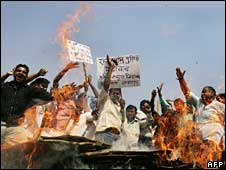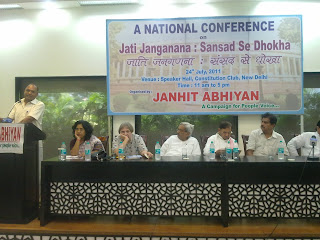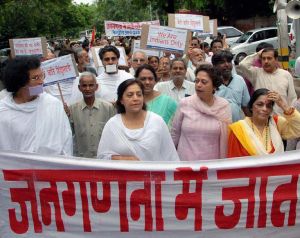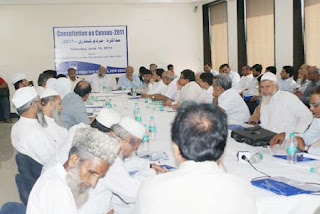THE RESPONSE OF DIFFERENT CASTE GROUPS AND COMMUNITIES
Post by Peddawad Chaitanya
EE11B096
The
Socio-Economic Caste Census in 2011 was started in the month
of June and
was expected to be completed throughout the country within certain
period of time in which authorities were unable to complete the task.
So, the deadline was extended till December month.
There were many reasons which caused this entire process to slow down
by more or less few months. During this time, response of different
caste groups and communities from various parts of India were
recorded and necessary changes were made in the enumeration process and targets were resettled by applying
changes in some parts of the procedure of caste census. The union government had finally agreed to the demands expressed by various political parties, especially those led by backward class leaders, to carry out caste census. The cabinet, after a lengthy discussion, decided to hold the enumeration of castes other than Scheduled Castes and Scheduled Tribes from June 2011. After considering many options, the option that was approved was that the caste must be canvassed and the integrity of the headcount must not be affected. Thus, this post is
going to be all about discussing the response of different caste
groups, communities, and people to the introductory concept (for that
time) of including caste in the census and overlooking their reaction
and behaviour throughout the duration of process of caste census
which started in 2011.
Several political leaders and academicians who addressed a National convention on " Caste Census : Betrayal of Parliament " organised by Janhit Abhiyan on July 24, 2011 at speakers hall,New Delhi, accused the Union Government of having cheated by going back on assurance given to Parliament of India on the question of Caste Census. They went to extent of calling the exercise of Caste census by Government of India as "Fraud " and said that it was lost case of those hopeful of caste census. The statement made was that if the convention was not the opinion of majority of people on this issue then the Government should better watch out before misleading the members on the farce they were upto in the name of caste census. They also added that this was promise made to Parliament of India so they warned government to ammend in the further sessions of Parliament.
Many Dalit people gathered under the name of ‘Intellectual Circle for Dalit Actions (ICDA)' recently to discuss and respond in turn to the Socio-Economic Caste Census survey being done under the Ministry of Rural Development, Government of India, observed that the ongoing Socio-Economic Caste Census survey would promote the system governed by or believed in decision by majority (majoritarianism) leading to a situation in which rare communities could be oppressed and it might also provide legal validity and spiritual or sacred recognition of caste as "The Cultural Manifesto of the State". They basically questioned the meaning, the agenda and the sole purpose of the caste census by saying that whatever process was going on was not a census based on the caste, but was an exercise to enumerate intermediate castes or Other Backward Classes, since data collection on SCs and STs was carried out during every census in this country. The group took objection on the whole process by noting that the ongoing exercise was not undertaken by the Census of India and criticising that this survey is a response to cases filed against OBC reservation in Central government employment and educational institutions and also the 69% reservation policy of Tamil Nadu and Parliament approval of reservation in the same institutions and Central services.
S. Shankarappa, chairman of the Karnataka State Permanent Backward Classes Commission got a lot of response from different communities at public hearing, regarding caste census and its early completion, organised in Bangalore recently. Many groups complained that due to delay in caste census and absence of accurate and sufficient data on backward classes in Karnataka was highly responsible for many communities not getting their right in reservation quota. Kshatriya Maratha community responded on the same issue that the population size of community, social and economic status of people living in the community and extent of their backwardness are unknown because of excessive delay in holding the census. Maheshwari, Kshatriya Maratha and Shivarchaka communities submitted their response to the commission. Some communities demanded the re-classification within backward classes list while some demanded inclusion in the backward class. Sooryavamsha Kshatriya Hindu Kalal, Khatik, Katuka, Hadapada, Bellalla Okkaliga and Appanna community also submitted their response regarding the same issue of reclassification within/inclusion in backward class list.
There
was positive as well as negative response from different caste groups
throughout the country. Some of them were appreciating this step of
the Ministry of Rural Development which was really helpful to some
groups of society while some did not accept it thus responded
correspondingly the way they thought to express their demands and
issues related to the caste and the census, to the government.
Several political leaders and academicians who addressed a National convention on " Caste Census : Betrayal of Parliament " organised by Janhit Abhiyan on July 24, 2011 at speakers hall,New Delhi, accused the Union Government of having cheated by going back on assurance given to Parliament of India on the question of Caste Census. They went to extent of calling the exercise of Caste census by Government of India as "Fraud " and said that it was lost case of those hopeful of caste census. The statement made was that if the convention was not the opinion of majority of people on this issue then the Government should better watch out before misleading the members on the farce they were upto in the name of caste census. They also added that this was promise made to Parliament of India so they warned government to ammend in the further sessions of Parliament.
Many Dalit people gathered under the name of ‘Intellectual Circle for Dalit Actions (ICDA)' recently to discuss and respond in turn to the Socio-Economic Caste Census survey being done under the Ministry of Rural Development, Government of India, observed that the ongoing Socio-Economic Caste Census survey would promote the system governed by or believed in decision by majority (majoritarianism) leading to a situation in which rare communities could be oppressed and it might also provide legal validity and spiritual or sacred recognition of caste as "The Cultural Manifesto of the State". They basically questioned the meaning, the agenda and the sole purpose of the caste census by saying that whatever process was going on was not a census based on the caste, but was an exercise to enumerate intermediate castes or Other Backward Classes, since data collection on SCs and STs was carried out during every census in this country. The group took objection on the whole process by noting that the ongoing exercise was not undertaken by the Census of India and criticising that this survey is a response to cases filed against OBC reservation in Central government employment and educational institutions and also the 69% reservation policy of Tamil Nadu and Parliament approval of reservation in the same institutions and Central services.
It
also raised concerns over the meaning of backwardness . Even if
castes were described as Backward Classes, as they were
educationally, economically and socially deprived, many of these
registered as MBCs and BCs were socially, politically and
economically powerful and dominant. The forum also mentioned how they
suffered from non-implementation of SC/ST reservation and
emancipation of the most under-privileged strata of society over the
past 60-70 years. It in turn questioned how the current census
addressed this difficult situation (predicament) or furthered the
utter destruction of caste. This was thrilling response of Dalit
people in which they pulled out the disadvantages and setbacks of the
foregoing caste based census and tried to make government realise the
same.
Members of 'MERI JAT HINDUSTANI' during a demonstration against caste-based census, at Jantar Mantar in New Delhi,on July 27,2011.
Proper Rhyming words in Hindi mean that " Don't include caste in census and don't divide the nation on this basis."
Proper Rhyming words in Hindi mean that " Don't include caste in census and don't divide the nation on this basis."
S. Shankarappa, chairman of the Karnataka State Permanent Backward Classes Commission got a lot of response from different communities at public hearing, regarding caste census and its early completion, organised in Bangalore recently. Many groups complained that due to delay in caste census and absence of accurate and sufficient data on backward classes in Karnataka was highly responsible for many communities not getting their right in reservation quota. Kshatriya Maratha community responded on the same issue that the population size of community, social and economic status of people living in the community and extent of their backwardness are unknown because of excessive delay in holding the census. Maheshwari, Kshatriya Maratha and Shivarchaka communities submitted their response to the commission. Some communities demanded the re-classification within backward classes list while some demanded inclusion in the backward class. Sooryavamsha Kshatriya Hindu Kalal, Khatik, Katuka, Hadapada, Bellalla Okkaliga and Appanna community also submitted their response regarding the same issue of reclassification within/inclusion in backward class list.
Moreover, All India
Christian Council wrote
a letter directly to the Prime Minister of India showing immense
concern about how the serious flaws in enumeration of the
foregoing caste census are affecting Dalit,
OBC and MBC
Christians,
from the experiences of the Christians from various parts of the
country. The complaint was that the enumerating staff had patently
not been properly instructed and trained. In this letter, the Dalit
Christians urged the government to grant them Schedule Caste status
and requested to enumerate Christians for their caste origins in the
foregoing caste census.
Many
local political parties demanded that the caste census should be
separated from the socio-economic census and should rather be
conducted under the Registrar General of India for its authenticity.
In response to caste census, many Muslim
organisations announced
the establishment
of Committee for Census and Reservation on
24th June,2011.
The agenda was decided and announcement was finally made after long discussions spread over two days, the first being on June 19 at the Constitution club and second at the Institute of Objective Studies. The purpose was to create awareness among Muslims all over India, about census 2011, the house listing for which had already begun. The points such as how the caste census can benefit Muslims in India were discussed. A few Muslim communities were included in OBC category, so new demands were made to include many more communities from within the Muslim. The last caste-based census was held in the year 1931, wherein the OBCs were covered and complained that despite a large number of representations to the home ministry for inclusion of OBCs in Census 2011, there had been no positive response. Empowerment ministry and social justice also had eventually admitted that they were trying to fix the targets under various schemes of uplifting OBC population without having the actual collected data. Moreover OBC population complained that even if this ministry had written to the census authorities to find exact number of OBC population, the request had been turned down.
The agenda was decided and announcement was finally made after long discussions spread over two days, the first being on June 19 at the Constitution club and second at the Institute of Objective Studies. The purpose was to create awareness among Muslims all over India, about census 2011, the house listing for which had already begun. The points such as how the caste census can benefit Muslims in India were discussed. A few Muslim communities were included in OBC category, so new demands were made to include many more communities from within the Muslim. The last caste-based census was held in the year 1931, wherein the OBCs were covered and complained that despite a large number of representations to the home ministry for inclusion of OBCs in Census 2011, there had been no positive response. Empowerment ministry and social justice also had eventually admitted that they were trying to fix the targets under various schemes of uplifting OBC population without having the actual collected data. Moreover OBC population complained that even if this ministry had written to the census authorities to find exact number of OBC population, the request had been turned down.
Finally,
the point to note is that the response of different caste population
is the main cause which tend to make some changes and bring some
revolutions in the whole process of caste-based census and by being
responsive, how people at least think of their own community's
benefit and uplift in the society, more or less earns credit of
positive linkage with development of the country !
Source :
- Article by D.Karthikeyan ,The Hindu, May 14,2012.
- OBC census ,TOI editorial , April 13, 2010.
- News, Institute of objective studies.
- All India Christian Council





No comments:
Post a Comment